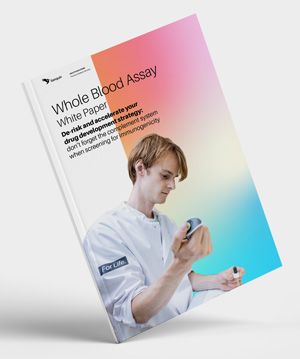

Case: How Sanquin PBS’ knowledge of neutrophils helped Galapagos accelerate its therapy development
Neutrophil granulocytes are a specific type of white blood cells that quickly spring into action to combat pathogens. These cells have multiple modes of action that can be activated voluntarily or involuntarily by therapeutic biological drugs. However, neutrophils are difficult to study. Sanquin Pharma & Biotech Services (Sanquin PBS) is one of the few CRO’s in Europe that has the specific expertise and experience to assist companies with evaluating the effects of their drug candidates on neutrophils.
Galapagos, a prominent biotechnology company active in the field of immunology and oncology, found evidence that one of their drug discovery candidates might have an effect on neutrophils. In literature a compound was described with a similar molecular pathway activity to the mechanism-of-action as their drug discovery candidate, which had a scientifically interesting effect on neutrophils. Galapagos asked Sanquin PBS to assess whether their compounds had a similar effect. Following the study which Sanquin performed and the support in the interpretation of results which it provided, Galapagos was able to decide on the appropriate follow-up steps in an early stage of drug development.
Neutrophils: eager to act - difficult to study
Neutrophil granulocytes are part of the innate immune system that attack pathogens quickly in case of an infection. They make use of a broad variety of strategies, such as engulfing the pathogen (phagocytosis), piercing the cell wall of the pathogen by excreting enzymes that are stored in granules (degranulation) and capturing pathogens by setting up traps of extracellular DNA (NETosis). However, when triggered inadvertently, their aggressive nature can also lead to unwanted side effects.
Sanquin has more than 40 years of experience working with this cell type. Neutrophils have a short lifespan and are difficult cells to work with: they cannot be cultured, are readily activated during isolation from blood, and die quickly within six hours. Sanquin has optimized the workflow – fresh blood is treated with caution and the cells are isolated rapidly with care. Sanquin is therefore able to study all aspects of activities of neutrophils, including the abovementioned phagocytosis, degranulation, and NETosis, as well as other functional aspects such as migration, cytokine release and apoptosis.
Sanquin is regularly contacted by pharmaceutical companies to assess the effects of therapeutic antibodies or chemical compounds in development on various functions demonstrated by neutrophils. For instance, when a compound has an effect on an enzyme, such as a certain kinase, Sanquin’s scientists can advise how this can affect neutrophils and perform assays that are suitable to study and substantiate this. In addition, if a client discovers during in vivo studies that neutrophils are showing reduced migration, Sanquin is able to study the effect of the compound on neutrophils to help understand the mode of action of the compound.

Neutrophils are difficult cells to work with.
Sanquin has more than 40 years of experience working with this celltype.
Galapagos’ research question
Galapagos discovered that a compound with a similar mechanism of action to one of their promising drug candidates was described to have an effect on neutrophils. They wanted to investigate whether their compounds affected neutrophils the same way as was described in literature. Given the deep expertise of Sanquin PBS, Galapagos decided to outsource this study to them. Subsequently, Sanquin PBS, in collaboration with Galapagos, selected the assay that was suitable for answering its research question.
The approach used
Galapagos had direct contact with the neutrophil experts of Sanquin PBS. They defined the study’s scope and approach in two online sessions. It was decided which compounds would be tested and in which concentration. They determined the read-out, discussed which time intervals between the various steps in the test would be most relevant, and importantly, decided which positive and negative controls to use.
After completing the research, Sanquin PBS reported the results back to Galapagos, and helped evaluate and interpret these results. Based on the feedback received, Sanquin performed new assays which confirmed the hypothesis.
The results
The compounds of Galapagos did not impact neutrophil biology similar to what was described in literature with a compound acting upstream of the same pathway. This was surprising, initially. However, careful considerations lead to the hypothesis that the effect described in literature could be the result of a small fraction of monocytes in the neutrophil isolates. It is known that a contamination of as little as 1% of monocytes in a fraction of isolated neutrophils can affect the results dramatically. Sanquin’s cell isolation workflow is robust and results in a pure fraction of neutrophils. Various markers demonstrated that the neutrophil fractions isolated for the Galapagos study did not contain any monocytes. Sanquin subsequently showed in the assay that the compound had the described effect when performed on a monocyte preparation.
As a result of this study, Galapagos was able to discover at an early stage that their test compounds did not have an intrinsic effect on neutrophils, and consequently decide on the next steps to be taken. They were pleased with the extensive support in the interpretation and elucidation of the results offered by Sanquin PBS.
White paper

Service pages
